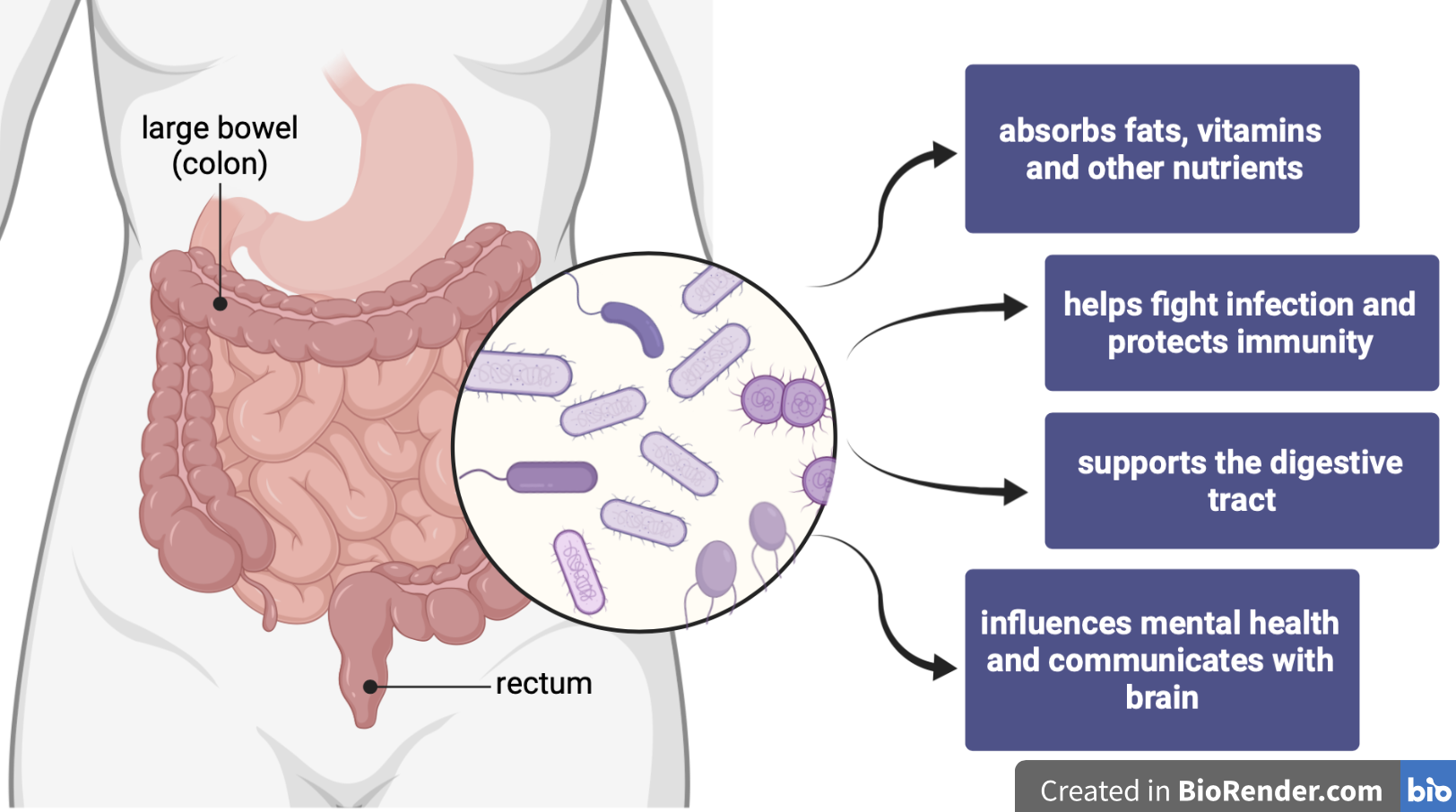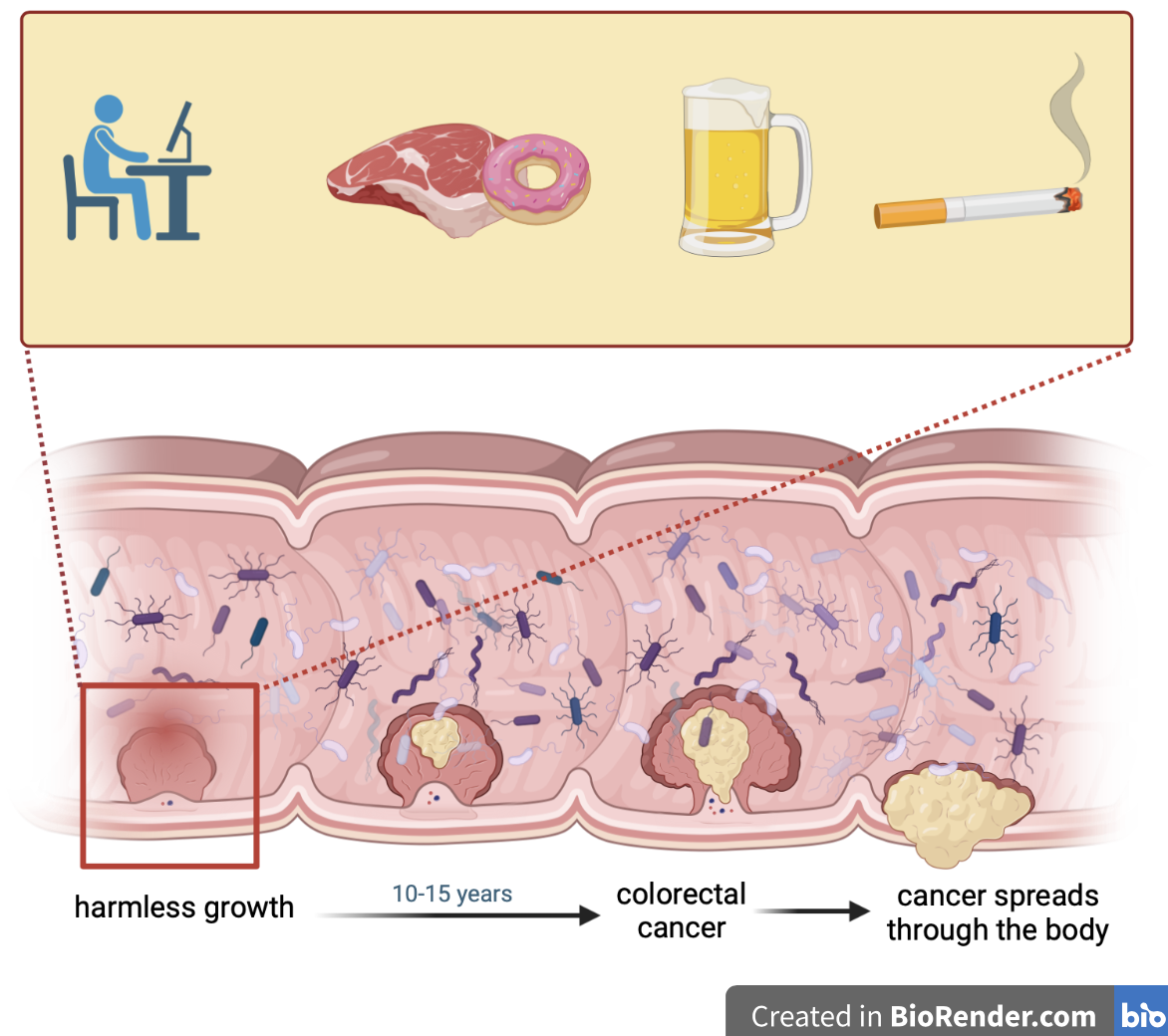A Gut Feeling
What’s lurking in our gut?
The curious case of rising bowel cancer cases in young adults
by Katarína Balážová, April 4th 2022
The passing month of March marked the European Colorectal Cancer Awareness Month. It was dedicated to shining a light on Europe’s second deadliest cancer, which most often affects the large bowel. While European governments have been investing into extensive screening programs for the elderly, the disease has now been stunning scientists by rearing its head in the younger population. So much so that people in their 30s are twice as likely to develop colorectal cancer now than in the mid-00s. However, the root cause of the shift towards people under 50 is proving to be quite confusing. Luckily, recent research might be bringing us closer to understanding this phenomenon, as it suggests that the clue might be in the gut microbiota.
At any given moment, about 40 trillion fungi, bacteria, and viruses – collectively known as the microbiota – exist in our bodies, outnumbering our own body cells by about 10 trillion. While invisible to the human eye, the gut microbiota is working hard to keep each one of us alive. It helps us absorb nutrients from food, supports our immunity and keeps the gut healthy (pictured below). These microscopic workers are mostly helpful, but they can also be involved in the development of diseases, such as colorectal cancer.

The many roles of gut microbiota in keeping us and our bowel healthy.
As Dr. Marcel de Zoete, a medical microbiologist from UMC Utrecht explains, “There is a very big role of gut microbiota in colorectal cancer. There are certain types of bacteria that produce toxins that we know are cancer-causing.” Colorectal cancer is one of the biggest cancer-related killers both in Europe and worldwide. Its development starts from a harmless growth in the bowel and takes a long time to reach a cancer state (pictured below). Because of this, it is usually thought of as a cancer of the elderly.
Indeed, it is the people above 55 years who are included in screening programs organized by European health councils. These screening programs are now seeing the initial fruits of their labor – they’re managing to catch the early cancers which need less treatment. “We have more local excisions rather than removing large parts of the bowel, we have fewer patients in which the cancer has spread through the body at the time of presentation, so they need less chemotherapy,” says Dr. Iris Nagtegaal, a professor of gastrointestinal pathology at UMC Radboud whose expertise guides the Dutch population screening program. Despite this positive news, cancer scientists have recently noticed a peculiar shift – it is the young people under 50 who are being increasingly affected by this disease.
Most prominently, colorectal cancer in young adults was thrust into the public eye in 2020 with the death of Chadwick Boseman. Boseman was an actor recognized for the superhero role of Black Panther. He quietly battled this disease for four years but succumbed to it at the age of 43. European studies collecting information about this phenomenon report that the rates of colorectal cancer in younger adults of 20-39 years increase by about 6% each year. Other parts of the world like Canada, Australia, China, and the USA – Boseman’s country of birth – are experiencing the same shift. An intense search for answers to why this is happening is now pointing towards the gut microbiota as one of the potential culprits.
Curiously, cancer scientists are also noticing that colorectal cancer in the younger population seems to differ from the elderly, as it requires far more aggressive treatment. In 2021, scientists from the Fudan University in Shanghai compared stool samples from young and old patients. They found that the elderly had different bacteria in the gut than the young. We don’t know how this directly relates to the causes of colorectal cancer. However, the ability to associate different microbiota with a risk for this disease in different age groups might eventually provide “a whole new way of thinking about detecting cancers, or doing population screening,” Nagtegaal explains. How exactly can gut microbiota play a role in colorectal cancer in young adults?
The gut microbiota is very sensitive to changes in our lifestyle and behavior. As Nagtegaal remarks, nowadays “There is less activity, people work behind computers all day, so that’s really a risk for all kinds of diseases and perhaps also for colorectal cancer.” Indeed, the gut microbiota can be negatively affected not only by a sedentary lifestyle, but also by habits such as smoking, drinking alcohol, or the so-called Western-style diet. This diet is rich in red processed meat, sugar, and fat (pictured below).
“Eating lots of red meat is generally accepted as bad because microbiota turns it into toxic compounds,” specifies de Zoete. He also mentions that while this is not a black and white situation, bacteria-produced toxins could indeed tip the scales towards cancer, even in young people. While being mindful of prevention through good nutrition and an active lifestyle might be our best bet, many colorectal cancer therapies are being developed to help us fight the disease once it appears.

Inside the bowel: Our lifestyle and eating habits can negatively affect the gut microbiota and support the development of colorectal cancer.
In particular, both Nagtegaal and de Zoete are enthusiastic about the prospects of immunotherapy – a new type of medicine that can help your immune system attack the tumor – in the fight against colorectal cancer. Rather surprisingly, the bacteria might not just be involved in the development of this disease, but they can also have an effect on the cancer treatment.
“It’s now been pretty clearly shown that the microbiota actually plays a role in how well the immunotherapy works,” says de Zoete. “There are bacteria that they [the microbiologists] identified that actually help boost this immunotherapy, and in the opposite way, there are bacteria that we think are bad. So, if you have certain bacteria then your immunotherapy just doesn’t work as well.” He adds that certain companies have already started thinking about giving good bacteria to the patient to improve the effects of the immunotherapy. So, when could treatment options like this become available?
According to de Zoete, the search for good bacteria is currently exploding. However, he doesn’t foresee any major developments happening soon. “I think in 10 years from now there will be enough information and enough tools to really start changing the microbiota,” specifies de Zoete. What can we do in the meanwhile? “Don’t eat too much meat… and don’t overcook it!” he laughs.
Fixing this disease in one age group just for it to appear in another group might seem like we are spinning in circles. However, we can rest assured that cancer scientists and microbiologists are determined to get to the root of the problem. They are on a mission to find out more about the causes, the diagnostics, and potential treatment to minimize the negative effects of this disease once and for all.
References
Akimoto, N., Ugai, T., Zhong, R., Hamada, T., Fujiyoshi, K., Giannakis, M., Wu, K., Cao, Y., Ng, K., & Ogino, S. (2021). Rising incidence of early-onset colorectal cancer — a call to action. Nature Reviews Clinical Oncology, 18(4), 230–243. https://doi.org/10.1038/s41571-020-00445-1
Hofseth, L. J., Hebert, J. R., Chanda, A., Chen, H., Love, B. L., Pena, M. M., Murphy, E. A., Sajish, M., Sheth, A., Buckhaults, P. J., & Berger, F. G. (2020). Early-onset colorectal cancer: initial clues and current views. In Nature Reviews Gastroenterology and Hepatology (Vol. 17, Issue 6, pp. 352–364). Nature Research. https://doi.org/10.1038/s41575-019-0253-4
Vuik, F. E. R., Nieuwenburg, S. A. V., Bardou, M., Lansdorp-Vogelaar, I., Dinis-Ribeiro, M., Bento, M. J., Zadnik, V., Pellisé, M., Esteban, L., Kaminski, M. F., Suchanek, S., Ngo, O., Májek, O., Leja, M., Kuipers, E. J., & Spaander, M. C. W. (2019). Increasing incidence of colorectal cancer in young adults in Europe over the last 25 years. Gut. https://doi.org/10.1136/gutjnl-2018-317592
Wong, S. H., & Yu, J. (2019). Gut microbiota in colorectal cancer: mechanisms of action and clinical applications. In Nature Reviews Gastroenterology and Hepatology (Vol. 16, Issue 11, pp. 690–704). Nature Publishing Group. https://doi.org/10.1038/s41575-019-0209-8
Yang, Y., Du, L., Shi, D., Kong, C., Liu, J., Liu, G., Li, X., & Ma, Y. (2021). Dysbiosis of human gut microbiome in young-onset colorectal cancer. Nature Communications, 12(1). https://doi.org/10.1038/s41467-021-27112-y

